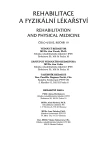Comparison of Electromyographic Activity of Selected Muscles during Exercises on Rocker Board and Balance Sandals
Authors:
N. Pospíšilová; D. Pavlů; D. Pánek
Authors‘ workplace:
Katedra fyzioterapie UK FTVS, Praha
vedoucí katedry doc. PaedDr. D. Pavlů, CSc.
Published in:
Rehabil. fyz. Lék., 19, 2012, No. 4, pp. 190-198.
Category:
Original Papers
Overview
The study investigated, documented, compared and analyzed electromyographic activity of selected muscles in the course of two kinds of simple exercise with the use of balance aids. The surface electromyography method was used in seven healthy probands and electromyographic activities of mm. gluteus maximus et medius, m. erector spinae, mm. vastus medialis et lateralis were compared in basic position, in standing on one leg, hovering or and walking while standing still on the balance sandals as well as on the rocker board in the anterior posterior plane. Based on the results obtained the authors recommend to use the cylinder segment as well as balance sandals as suitable aid for activation and strengthening m. gluteus medius. In selecting the aid the authors recommend to consider the degree of training or non-training of the individual and select the aid within the framework of progressive training, i.e. to begin with the simple aids and to continue with the more requiring ones. They also warn against new trends, which have not been so far based on quality research.
Key words:
electromyography, the metod of sensory motor stimulation, mm. gluteus maximus and medius, m. erector spinae, mm. vastus medialis et lateralis, rocker board, balance sandals
Sources
1. BANERJEE, P. et al.: Torso and hip muscle aktivity and resulting spine load and stability while usng the ProTitter 3-D Cross Trainer. Journal of Applied Biomechanice, 25, 2009, 1, s. 73-84.
2. BLACKBURN, J. T. et al.: Balance and joint stability: the relative contribution of proprioception and muscular strenght. Journal Sport Rahabilitation, 9, 2000, s. 315-328.
3. BLACKBURN, J. T. et al.: Exercise sandals increase lower extremity electromyographic activity during functional activities. Journal of Athletic Training, 38, 2003, 3, s. 198-203.
4. BULLOCK-SAXTON, J. E., JANDA, V. et al.: Reflex aktivation of gluteal muscles in walking. An approach to restoration of muscle function for patients with low-back - pain. Spine, 18, 1993, 6, s. 704-708.
5. ERICSSON, Y. B.: Effects of functional exercise training of performence and muscle strenght after meniscectomy: a randomized trial. Scandinavian Journal of Medicine & Science in Sports, 19, 2009, 2, s. 156-165.
6. HORSTMANN, T. et al.: EMG activation at hip and ankle joint muscles while balancing on pads with different surface textures. Proccedings of the 9th Annual TRAC Meeting. Budapest, Hungary, 2007, s. 12.
7. JANDA, V., VÁVROVÁ, M.: Senzomotorická stimulace: Základy metodiky proprioceptivního cvičení. Rehabilitácia, 25, 1992, 3, s. 14-34, ISSN 49 561.
8. JANDA, V. et al.: Svalové funkční testy. 1. vyd., Praha, Grada Publishing, 2004, 328 s., ISBN 80-247-0722-5.
9. KROBOT, A., KOLÁŘOVÁ, B.: Povrchová elektromyografie v klinické rehabilitaci. 1. vydání, Olomouc, Univerzita Palackého v Olomouci, 2011, 82 s., ISBN 978-80-244-2762-1.
10. LAUDNER, K. G., KOSCHNITZKY, M. M.: Ankle muscle activation when using the both sides utilized (BOSU) balance trainer. Journal of Strenght & Conditioning Research, 24, 2010, 1, ISSN 1533-4287, s. 218-222.
11. MICHELL, T. B. et al.: Functional balance training, with or without exercise sandals, for subjects with stableor unstable ankles. Journal of Athletic Training, 41, 2006, 4, s. 393-398.
12. MYERS, R. L. et al.: Balance sandals increase gluteus medius and gluteus maximus muscle activation amplitude during closed kinetic chain exercise. Journal of Athletic Training, 38, 2003, 2, s. 94.
13. PÁNEK, D., PAVLŮ, D., ČEMUSOVÁ, J.: Počítačové zpracování dat získaných pomocí povrchového EMG. Rehabil. fyz. Lék., 16, 2009, 4, s. 177-180.
14. PAVLŮ, D., PÁNEK, D.: EMG analýza vybraných svalů horní končetiny při pohybu ve vodním prostředí a proti odporu elastického tahu. Rehabil. fyz. Lék., 15, 2008, 4, s. 167-173.
15. PAVLŮ, D., PÁNEK, D.: EMG analysis of muscle fatigue by senzorimotor training - a contribution to evidence based physiotherapy. International Journal of Rehabilitation Research, 30, 2007, s. 105.
16. PAVLŮ, D., PÁNEK, D., ČEMUSOVÁ, J.: EMG aktivita m. biceps brachii am. Triceps brachii přo držení vibrační činky. Rehabil. fyz. Lék., 19, 2012, 1, s. 25-29.
17. POSPÍŠILOVÁ, N.: Analýza elektromyografické aktivity vybraných svalů na vybraných balančních plochách. Diplomová práce, Praha, Univerzita Karlova v Praze, FTVS, 2012, 76 s, vedoucí práce Dagmar Pavlů.
18. SLADKÁ H., PAVLŮ, D., PÁNEK, D.: EMG analýza vybraných svalů dolní končetiny a zádových svalů při jízdě na kole ve vodním prostředí a na suchu. Rehabil. fyz. Lék., 18, 2011, 3, s. 126-131.
19. WAHL, M. J., BEHM, D. G.: Not all instability training devices muscle activation in highly resistance-trained individuals. Journal of Strenght and Conditioning Research, 22, 2008, 4, s. 1360-1370.
Labels
Physiotherapist, university degree Rehabilitation Sports medicineArticle was published in
Rehabilitation & Physical Medicine

2012 Issue 4
- Hope Awakens with Early Diagnosis of Parkinson's Disease Based on Skin Odor
- Deep stimulation of the globus pallidus improved clinical symptoms in a patient with refractory parkinsonism and genetic mutation
-
All articles in this issue
- Functional Diagnostics – Precondition for the Physiotherapist’s Success
- Analysis of Influence of Regular Physiotherapy on the Fatigue Level in MS Patients with Different Degrees of Disability
- Possibilities of Spa Therapy in Patients with Idiopathic Scoliosis
- Diagnostics of the Foot Function in Daily Practice
- Electromyography Activity of Lower Leg Muscles during Walking on High Heels
- Comparison of Electromyographic Activity of Selected Muscles during Exercises on Rocker Board and Balance Sandals
- Hypermobility in Sport
- Rehabilitation & Physical Medicine
- Journal archive
- Current issue
- About the journal
Most read in this issue
- Possibilities of Spa Therapy in Patients with Idiopathic Scoliosis
- Hypermobility in Sport
- Diagnostics of the Foot Function in Daily Practice
- Functional Diagnostics – Precondition for the Physiotherapist’s Success
